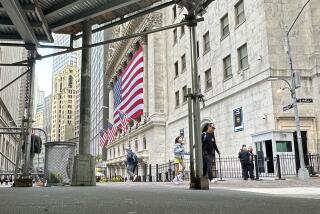Markets Skid Sharply, Ending 2-Day Rally : Dow Index Retreats 19.25; 30-year Bond Drops $15
NEW YORK — The stock market lost ground Thursday as a steep slide in the bond market and concern over a weaker dollar carried over to Wall Street, ending a two-day rally that saw a gain of 90 points.
The Dow Jones average of 30 industrials, up 92.85 points Tuesday and Wednesday, dropped back 19.25 to 2,566.42.
Volume on the New York Stock Exchange slowed to 162.15 million shares from 220.28 million in the previous session. Activity was curtailed by the observance of Rosh Hashanah, the Jewish New Year.
A major drag on the market was a rise in open-market interest rates. The Treasury’s bellwether 30-year issue finished the session about $15 lower after dipping about $2.50 per $1,000 face amount on Wednesday. Its yield, which moves inversely to its price, jumped to 9.69% Thursday from the previous session’s 9.54%.
Some stock traders also were skeptical that the market’s upsurge this week signaled the end of the “correction” that set in late last month.
Traders said the bargain hunting that helped boost prices in the past two sessions dried up when stocks approached the 2,600 level early in the session.
“There was just nothing particularly bright in the market picture today,” said analyst Hugh Johnson of First Albany Securities. “I think that we saw a rally in the context of a correction this week,” he added.
Federal Reserve efforts to stabilize the dollar in recent weeks have siphoned off a good deal of cash from the money market. Higher interest rates make borrowing money more expensive--and, therefore, serving to slow down the economy.
Eyes on Group of 7
If the dollar falls further and the Federal Reserve nudges rates up even higher, the market could be in for more problems. “The catalyst, one way or another, is the dollar,” said Johnson, who sees the market falling as low as 2,350 before the correction is completed.
The dollar drifted lower and “people are a little reluctant to make any moves ahead of the G-7 meeting this weekend,” Johnson said.
Finance ministers from the seven leading industrialized countries, known as the so-call Group of Seven, are meeting in Washington this weekend as part of next week’s annual meeting of the International Monetary Fund and World Bank.
Losers among the blue chips included Merck, down 4 3/4 at 200; General Electric, down 1 at 61; Coca-Cola, down 1 at 48 1/8; RJR Nabisco, down 1 1/2 at 65 1/2; McDonald’s, down 1 7/8 at 54, and American Express, down 1 at 35 7/8.
But International Business Machines gained 1 5/8 to 155 7/8, among several computer and technology issues that bucked the down trend. Digital Equipment added 1/2 to 189 7/8; Computer Sciences rose 2 5/8 to 67 1/2 and Compaq Computer climbed 4 3/4 to 65 7/8.
A Wall Street Journal article discussed Compaq’s planned introduction of speedier portable and desktop computers.
Several producers of machinery and industrial goods also moved up, continuing a recent advance that has been prompted by signs of a strengthening in the manufacturing sector of the economy.
Deere & Co. rose 1 to 40 1/8; Caterpillar gained 2 to 73 3/8; Norton Co. added 2 to 57 3/4, and Clark Equipment edged up 7/8 to 33 1/2.
Holly Farms fell 5 1/8 to 35 1/2. The company projected a substantial quarterly earnings decline.
Polaroid Corp. fell 2 3/4 to 31 7/8 after an analyst reduced earnings estimates on the photographic equipment manufacturer.
Declining issues outnumbered advances by about 8 to 7 in the overall tally on the NYSE.
Nationwide turnover in NYSE-listed issues, including trades in those stocks on regional exchanges and in the over-the-counter market, totaled 184.40 million shares.
Among market indicators, the NYSE’s composite index of all its listed common stocks lost 0.67 to 178.86. Standard & Poor’s index of 400 industrials fell 1.51 to 373.78, and S&P;’s 500-stock composite index was down 1.47 at 319.72. The Wilshire index of 5,000 equities closed at 3,147.037, down 9.481.
Japanese Might Take Action
In the meantime, the credit markets took a tumble in thin, volatile trading amid speculation that Japan might raise its interest rates and uncertainty surrounding the passage of the Gramm-Rudman deficit-reduction bill.
The federal funds rate, the interest on overnight loans between banks, traded at 7.38%, up from 7% Wednesday.
Prices for most corporate and municipal bonds also declined sharply.
“There is a fear that the Japanese are going to tighten monetary conditions due to worries about inflation there,” said Jay Goldinger, an investment banker with Beverly Hills-based Cantor, Fitzgerald & Co. “The market (here) is very jittery.”
Higher interest rates in Japan would tend to support the Japanese yen, thereby depressing other currencies, such as the dollar, explained Nancy Vanden Houten, a money market economist for Merrill Lynch Capital Markets.
The dollar was off against most major currencies Thursday, and that also had a negative impact on bond prices, analysts said.
A weaker dollar is a major concern in the credit markets because it makes dollar-denominated bonds and notes less attractive to foreign investors and enhances the possibility of higher inflation and interest rates.
Reagan Decision Awaited
Analysts said investors also were reluctant to buy bonds due to uncertainty surrounding the Gramm-Rudman bill, which was passed by Congress and now sits on President Reagan’s desk for either approval or a veto.
Bondholders like the legislation because it lessens the government’s debt, thereby decreasing the supply of bonds and increasing the value of most of the ones already in the market.
Reagan has not decided whether he will sign the bill due to a separate provision that provides a new enforcement mechanism for the Gramm-Rudman deficit-cutting law.
In the secondary market for Treasury bonds, prices of short-term governments were off between point and 3/8 point, intermediate maturities were 5/8 point to 3/4 point lower and 20-year issues fell 1 5/8 point, according to figures provided by Telerate Inc.
The movement of a point is equivalent to a change of $10 in the price of a bond with a $1,000 face value.
In corporate trading, industrials were down 5/8 point and utilities were 3/4 lower in light trading, according to Salomon Bros.
Among tax-exempt municipal bonds, general obligations declined a point and dollar bonds slipped 1 1/2 points, Salomon Bros. said. Trading was light.
Yields on Treasury bills were mixed. Three-month bills were down 7 basis points to 6.42%; six-month bills were up 2 basis points to 6.79%, and one-year bills were up 10 basis points at 7.19%.
A basis point is one-hundredth of a percentage point.
More to Read
Inside the business of entertainment
The Wide Shot brings you news, analysis and insights on everything from streaming wars to production — and what it all means for the future.
You may occasionally receive promotional content from the Los Angeles Times.










